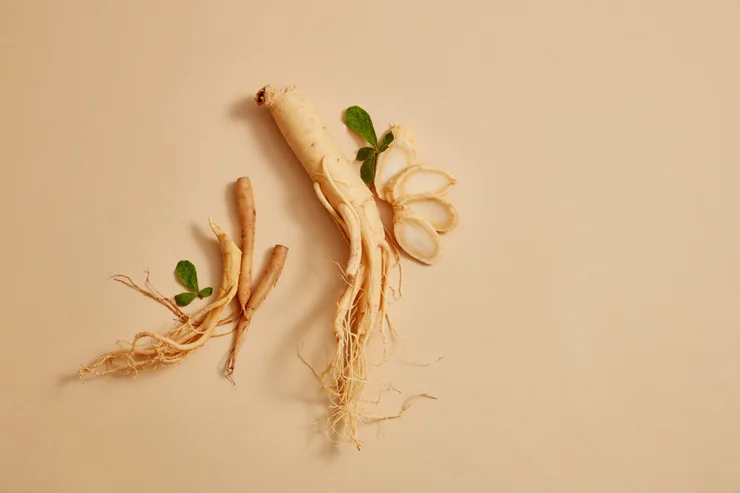Health
Ginseng Tea: Types, Uses, & Wellness Potential
October 11, 2023
The role it plays in traditional medicine spans across several cultures including Chinese, Korean, and Native American.
In this article, we explore the scientific research supporting Ginseng tea, its health benefits, and how to make the perfect cup of Ginseng tea every time.
What Is Ginseng?

Ginseng refers to 11 different varieties of short, slow-growing plants with fleshy roots. Across all of these varieties, it has a light-colored, forked-shaped root, a relatively long stalk, and green leaves in an oval shape.
Nicknamed an “herb for all illnesses,” Ginseng has a history of being used as an aphrodisiac, an anti-aging remedy, an energy-boosting tonic, and a remedy to provide support for kidney disease, cardiovascular issues, and reproductive diseases (1).
Originating from the shaded woodlands of East Asia and North America, Ginseng is distinguished by its unique characteristics—particularly by its ginsenosides and gintonin content. In fact, it’s these two compounds that are largely responsible for Ginseng’s health benefits.
The Ginseng species primarily falls into two main categories, Panax ginseng—native to Asia—and Panax quinquefolius—found in North America. However, these two species vary in their concentration of the active compounds ginsenosides and gintonin, meaning they slightly differ in terms of their uses and benefits (2)
What’s the Science Behind Ginsenosides?
9 Health Benefits of Ginseng Tea
Ginseng tea is associated with a multitude of health benefits. Here are more than a few reasons why this tea might be a great addition to your daily wellness routine.
1. Supports Immunity
The antioxidant properties of Ginseng help regulate the immune system, which can potentially enhance the body’s resistance to illnesses and infections. Studies further show how Ginseng can regulate each type of immune cell, including macrophages, T cells, B cells, natural killer cells, and dendritic cells (5).
2. Improves Cognitive Function
"Ginseng has been shown to have a neuroprotective effect, which may help with cognitive decline and degenerative brain diseases such as Alzheimer's," says registered dietitian Abbie Gellman.
Research suggests that Ginseng may help improve mental clarity, improve concentration, and help manage cognitive disorders like Alzheimer’s disease (6).
In fact, one research study goes as far as to indicate that the benefits of Ginseng accumulate over time, meaning the use of Ginseng in one’s regular regime for five years or more may have increased cognitive protective effects (7).
3. Increases Energy
Fatigue is a common ailment. Many women report feeling more fatigued at a certain time of the month and during perimenopause and menopause. Yet, surprisingly, Ginseng might offer a bit of a boost. Studies show how Ginseng supplementation decreases perceived fatigue and enhances energy levels (8).
In turn, Ginseng is also used by athletes to improve endurance and reduce fatigue in relation to training and performance.
4. Lowers Stress & Anxiety
Ginseng exerts a calming effect and can help the body adapt to stress, potentially reducing anxiety, depression, and overall stress levels. This is largely thought to result from Ginseng’s impact on the hypothalamic-pituitary-adrenal (HPA) axis, which may influence key hormones involved in mood (9).
5. Aids Digestion
In particular, Ginseng tea is thought to soothe digestive distress, reduce inflammation in the digestive tract, and alleviate symptoms associated with conditions like Irritable Bowel Syndrome (IBS) (10).
6. Regulates Blood Sugar Levels
Andrew Huberman stated on his podcast that, “Things like panax Ginseng can have effects on reducing blood glucose slightly.”
Gellman agrees, “Ginseng may help improve glucose metabolism, which helps blood sugar control" and may help treat type 2 diabetes.” And the research supports this.
Studies have indicated that Ginseng might have a role in improving insulin sensitivity, increasing insulin production, and thus, reducing blood glucose levels (11). This may make it particularly beneficial for those with diabetes or blood sugar issues.
7. Supports Cardiovascular Health
Regular consumption of Ginseng tea is associated with improved blood circulation, reduced cholesterol levels, and a decreased risk of heart disease (12).
8. Promotes Weight Loss
Ginseng tea is often associated with boosting the metabolism. So, are these claims true? Well, research indicates that Ginseng may help increase caloric expenditure and even reduce caloric intake (13).
While this is no replacement for a healthy diet and exercise, Ginseng tea can complement a balanced lifestyle and support your weight loss efforts.
9. Supports Sexual Health
Traditionally, Ginseng has been used to enhance sexual function and treat sexual dysfunction—and the research tends to support this.
Ginseng has been shown to improve sexual arousal in menopausal women (14). For men, Ginseng may improve erectile dysfunction and even enhance sperm quality and count (15).
Are There Different Types of Ginseng Tea?
The two main types of Ginseng include the Asian variety, Panax, and the American variety, Panax quinquefolius. Generally, like any tea, the taste is described as bitter and earthy.
However, the type of Ginseng inevitably impacts the flavor. The Asian Ginseng tea tends to be better with a bit of “heat.” Meanwhile, the American Ginseng tea is also bitter, as mentioned, but offers more of a “cooling” sensation despite being a warm beverage.
In some varieties, you’ll find Ginseng mixed with ginger for an additional health-boosting tea (along with even more flavor). Many people also like to add a bit of sweetness, such as with a teaspoon of honey or a dash of stevia.
How to Make the Perfect Cup of Ginseng Tea
While you can buy Ginseng tea bags from the store for greater ease and convenience, you can also make Ginseng tea straight from freshly sliced Ginseng. Here’s how to do it:
- Heat water to a boil, then allow it to cool slightly.
- Generally, Ginseng is best added when the water reaches 208°F or 98°C.
- Add about four to five grams of freshly sliced Ginseng (or around two to three small roots).
- Let the Ginseng steep for 5 to 10 minutes.
- Using a strainer to remove the sliced Ginseng, pour tea into a mug.
- Add honey and enjoy!
Frequently Asked Questions
Ginseng is considered safe for the average healthy adult when used short term. American ginseng is likely safe for up to 12 weeks, and Asian ginseng may be safe for up to six months (16, 17).
Some adverse effects have been reported. For example, it may lead to anxiousness and sleeplessness. Plus, caffeine may enhance the stimulating effects of ginseng.
Long-term or high-dose ginseng consumption can cause headaches, vertigo, abdominal discomfort, and other side effects.
Women who use ginseng daily may have menstrual irregularities. Additionally, ginseng may cause allergic responses.
Krista Bugden
Krista Bugden
Medical Disclaimer
This content is for informational and educational purposes only. It is not intended to provide medical advice or to take the place of such advice or treatment from a personal physician. All readers/viewers of this content are advised to consult their doctors or qualified health professionals regarding specific health questions. Neither Dr. Chad Walding nor the publisher of this content takes responsibility for possible health consequences of any person or persons reading or following the information in this educational content. All viewers of this content, especially those taking prescription or over-the-counter medications, should consult their physicians before beginning any nutrition, supplement, or lifestyle program.



